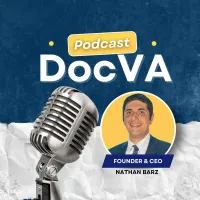
·S1 E55
How Do I Become a Scribe? Start Your Clinical Journey
Episode Transcript
Hey there! So, let me ask you something—have you ever finished a 12-hour shift thinking, “There has to be a better way to stay on top of charting”?
Yeah? You’re not alone. I’ve talked to so many nurses, PAs, even MDs who’ve felt the same way about drowning in documentation after long shifts.
And for a lot of people just starting out in healthcare, one of the smartest entry points into the clinical world right now is—yep—medical scribing.
So, let’s break this down. You’re probably wondering, “Okay, but like, how do I even become a scribe?” Right? Let's get into it.
Here’s the good news: you don’t need a med degree. You don’t even need years of schooling to get started as a scribe.
What you do need is an interest in medicine, a decent typing speed, a good ear for medical terms, and the ability to multitask like a boss.
Now, back in the day—like 5 or 10 years ago—being a scribe meant standing behind a doctor in the ER, frantically typing while they saw patients.
But today? It’s a whole new game. Thanks to companies like DocVA, you can work as a virtual medical scribe—yep, fully remote.
That means you can support doctors in real time, from anywhere. No scrubs, no commute, no hospital cafeteria food. Honestly, not mad about that.
Let’s say you’re a pre-med student. Or you’re switching careers. Scribing can literally be the launchpad you’ve been waiting for.
I know someone who scribed virtually from the Philippines while prepping for med school. She got exposure to multiple specialties from home.
And she had built-in mentorship just by working alongside physicians every day. Seriously—it’s that powerful.
Okay, so what does it take to actually become one? Let’s talk real steps. First, check out platforms like DocVA.com.
They’ve got training programs that walk you through everything—HIPAA compliance, EMR systems, and live documentation skills.
Most virtual scribe roles don’t require a formal certification, but they do want sharp English skills, focus, and strong attention to detail.
And yeah, you’ve gotta keep up with fast-paced medical conversations. Imagine transcribing a surgeon mid-procedure—minus the blood, of course.
So yeah—if you want to get your foot in the door, learn how clinics run, and actually help providers save time, scribing might be your move.
With remote options like DocVA, it’s never been easier or more flexible to jump in and build clinical experience on your terms.
Head over to docva.com, check what roles are open, and honestly—just apply. You’ve got nothing to lose and everything to gain.
Worst-case? You learn something new. Best case? You kick off your healthcare career—from your laptop.
Alright, that’s it for today’s episode. Catch you next time—and hey, go be someone’s secret weapon behind the charts. ✌️